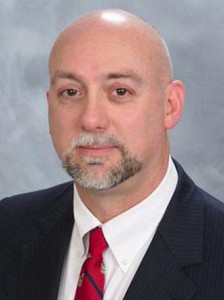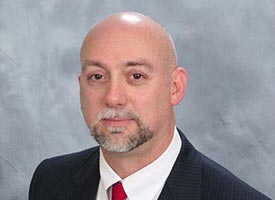By Roger Drinnon
ST. LOUIS — To establish a world ruled by Islamic law, Jesus and the Mahdi will battle against the deceiver al-Dajjal and then convert everyone to Islam to usher-in the end times. Wait … what? Jesus?

Muslim extremist groups like the Islamic State of Iraq and al-Sham (ISIS) seek to bring about this eschatological scenario through terrorist attacks, violent militant operations, well-funded propaganda and aggressive proselytizing efforts, according to one expert on the religion’s eschatology.
Islamist eschatology was the topic of Dr. Timothy R. Furnish’s Oct. 23 lecture at Concordia Seminary, St. Louis, titled “Fighting for the End of the (Christian) World.” The lecture was arranged by the Ethnic Immigrant Institute of Theology (EIIT), the seminary’s specialized program of theological education for pastoral leadership within immigrant-based LCMS congregations.
Furnish holds a Ph.D. in Islamic History from Ohio State University as well as a Master of Arts in Religion from Concordia Seminary. He is a veteran of the U.S. Army and consultant to the U.S. military and intelligence community.
“Islam claims to be the corrective to the ‘corrupted’ religions of Judaism and Christianity,” said Furnish. “In the Islamic view, [divine] revelations were given in three major groupings: to the Jews, about 1200 B.C.; to the Christians in the first century A.D.; and then 600 years later, the final revelation to [Islam’s founder] Muhammad.”
Furnish described Islam as a religion based on the theology of works, whereby one is deemed righteous by Allah, the Muslim god, through one’s actions and adherence to Islamic law. He said most Muslims believe as a precursor to the end times, Jesus – who the Muslims believe to be only a mortal prophet, not the Son of God – and the al-Mahdi, meaning “divinely guided one,” will come to establish a worldwide Muslim caliphate where people are either converted to Islam or killed. Both Sunni and Shiite Muslims believe in the Mahdi, even though he is not mentioned in the Quran – the Muslim holy book. Furnish said belief in the Mahdi comes from Islam’s authoritative “hadiths.”
“Information about the Mahdi and the Dajjal, the Muslim equivalent of an anti-Christ figure, occurs only in hadiths,” said Furnish. “The authoritative hadiths are a multivolume collection of sayings attributed to Muhammad which are secondary in authority – but only slightly secondary – to the Quran.”
He said many Muslims have claimed to be the Mahdi over the centuries following the founding of Islam.
Since Muslims believe the establishment of a worldwide Islamic caliphate under the Mahdi’s rule is required to bring about a judgment day, Islamist extremist groups believe violent “jihad” (which linguistically means “struggle” but historically means “holy war against non-Muslims”) will hasten the establishment of the caliphate and thus the divine resolution of human existence. Furnish said some Muslims, especially certain Sunni groups, adamantly believe they can “hotwire the apocalypse.” This apocalyptic goal poses a dire threat to Christians and Western societies in general who are demonized as “infidels” not just by “extremist” Muslim groups but also in mainstream Islamic teaching, following the Quran and hadiths. The threat of groups like ISIS, also known as the Islamic State of Iraq and the Levant, or ISIL, continues to be evaluated at the highest levels of the U.S military.
“Some of them seek to establish a sense of political Islam and theocracy under [Islamic] Shariah Law, and some of them are apocalyptic … meaning they have such a worldview … that makes them, I think, especially dangerous,” said Army Gen. Martin E. Dempsey, chairman of the Joint Chiefs of Staff, during the Aspen Security Forum in July. “[ISIS] seeks a sense of religious legitimacy; its leaders believe they are the heirs to the Islamic caliphate … They can only sustain that religious legitimacy if they continue to succeed, so this is not a group that can go halfway. It has to keep moving toward its ultimate end-of-days, apocalyptic narrative or it will lose support, because it loses religious legitimacy.”
Furnish said other key elements of the Islamist strategy to establish the global caliphate include well-financed Muslim missionary propaganda, or “da`wah,” and forceful conversions to Islam. ISIS even has its own magazine called Dabiq. Funding for da`wah comes from a variety of sources including Saudi Arabs, non-state donors and ISIS’ illicit profits from criminal activities like human trafficking (a recent issue of Dabiq stated non-Muslims may be enslaved under Islamic law), smuggling and trafficking in looted archaeological artifacts. He also explained how hadiths allow for and even encourage Muslims to deceive non-Muslims with propaganda as part of the strategy for establishing the caliphate — a tactic known as “taqiyyah,” or allowable lying.
Furnish, somewhat tongue-in-cheek, credits his life’s studies to the late actor Charlton Heston. As a youth, Furnish saw the 1966 film “Khartoum,” where Heston starred as British Gen. Charles Gordon, who was hired by the Ottomans to defend the Sudanese city from the forces of a jihadist army led by Muhammad Ahmad (who declared himself the Mahdi), during the Siege of Khartoum in the late 19th century.
Roger Drinnon is manager of Editorial Services for LCMS Communications.
Posted Nov. 14, 2014 / Updated Feb. 11, 2015
